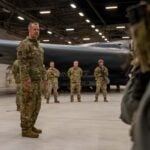HUNTINGTON BEACH, Calif.--Boeing [BA] is finishing up a critical program in its Family of Advanced Beyond Line-of-Sight Terminals (FAB-T) testing and is also preparing for another important test in the next month, according to a key company executive. Boeing Vice President of C3 Solutions and FAB-T Program Manager Paul Geery told reporters Monday the company was close to completing its system design and development (SDD) phase after finishing what Boeing calls the system functional qualification testing two weeks ago. Geery…
Contract Updates
R&M Government Services (Las Cruces, New Mexico) – $23,894,784
R&M Government Services,* Las Cruces, New Mexico, has been awarded a maximum $23,894,784 firm-fixed-price, indefinite-quantity contract for battery compartments. This was a sole-source acquisition using justification 10 U.S. Code 3204 (a)(1), as stated in the Federal Acquisition Regulation 6.302-1. This…
L3Harris Technologies Inc. (Clifton, New Jersey) – $9,571,947
L3Harris Technologies Inc., Clifton, New Jersey, is being awarded $9,571,947 for a firm-fixed-price contract for the procurement of 74 radio frequency amplifiers in support of Navy F/A-18E/F/G aircraft. The contract does not include an option provision. All work will be…
Sikorsky Aircraft Corp. a Lockheed Martin Co. (Stratford, Connecticut) – $21,600,000
Sikorsky Aircraft Corp., a Lockheed Martin Co., Stratford, Connecticut, is awarded a not-to-exceed $21,600,000 cost reimbursable undefinitized order (N0001926F1016) against a previously issued basic ordering agreement (N0001923G0002). This order provides for instantaneous access to 105% Transient Engine Torque test and…
Amentum Mitie Pacific LLC (Chantilly, Virginia) – $85,236,794
Amentum Mitie Pacific LLC, Chantilly, Virginia, is awarded an $85,236,794 fixed-price-award-fee, indefinite-delivery/indefinite-quantity contract for base operating support services at Navy Support Facility, Diego Garcia. Work will be performed at Diego Garcia, British Indian Ocean Territory, and is expected to be…













